|
|
|
Sort Order |
|
|
|
Items / Page
|
|
|
|
|
|
|
| Srl | Item |
| 1 |
ID:
155116
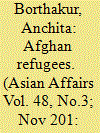

|
|
|
|
|
| Summary/Abstract |
One of the most important arenas that have been profoundly affected by the security situation in Afghanistan is Pakistan's internal security environment. The instability in Afghanistan has had a negative spill-over effect on Pakistan's domestic security scenario, as the Afghan quagmire poses immense implications on Pakistan's domestic framework. One of the important consequences of the Afghan conflict since the 1970s has been the massive inflow of the Afghan refugee population to the neighbouring Pakistan which in following years has brought about a number of demographic and security challenges to the Pakistani society. Therefore along with a number of factors, at this present juncture, Afghan refugees have also become a principal factor in determining Pakistan's Afghanistan policy.
|
|
|
|
|
|
|
|
|
|
|
|
|
|
|
|
| 2 |
ID:
180380
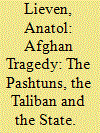

|
|
|
|
|
| Summary/Abstract |
Whatever happens in Kabul, the Taliban will remain the most powerful military and political force among the Pashtuns of Afghanistan.
|
|
|
|
|
|
|
|
|
|
|
|
|
|
|
|
| 3 |
ID:
111769
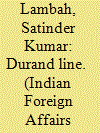

|
|
|
| 4 |
ID:
092186
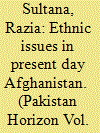

|
|
|
|
|
| Publication |
2009.
|
| Summary/Abstract |
The fragile political system has formed a nexus with political, sectarian, regional and ethnic fissures in Afghanistan.As long as there was a modicum of political order, ethnic and other related issues remained underground and did not cause much trouble although the deprivations of ethnic minorities kept simmering.
|
|
|
|
|
|
|
|
|
|
|
|
|
|
|
|
| 5 |
ID:
108369
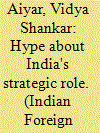

|
|
|
| 6 |
ID:
180034
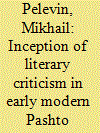

|
|
|
|
|
| Summary/Abstract |
The article overviews the earliest Pashto texts, mostly poetic, in which the incipient forms of literary criticism can be traced as authorial self-reflections related in Persian classics to the self-praise genre (fakhriyya) and explanations of reasons for composing works (sabab-i taʾlīf). Under close examination are the seventeenth century verses of the poets affiliated with the Roshānī religious community and the writings of Khushḥāl Khān Khaṫak (d. 1689). Analyzed texts prove that through the rudimentary discourse on a variety of literary criticism topics, Pashtun authors of early modern times declared and justified the presence of emerging literature in Pashto within the Persophone cultural space of Mughal India, articulating simultaneously their commitment to the proliferation of literacy and Islamic book culture among their countrymen.
|
|
|
|
|
|
|
|
|
|
|
|
|
|
|
|
| 7 |
ID:
079481
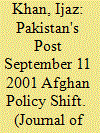

|
|
|
|
|
| Publication |
2007.
|
| Summary/Abstract |
Pakistan had supported the Taliban until September 11 2001, which had gradually alienated the whole region surrounding Pakistan and Afghanistan. After September 11 2001, US-led international military action brought a change in Afghanistan that brought to power forces inimical to Pakistan and supported by the rest of the countries of the region. Pakistan minimized the loss it felt by withdrawing support for the Taliban in the wake of 9/11 and becoming an ally in the `War against Terrorism', with the result that the USA has played a role in stopping the total regional isolation of Pakistan. Pakistan's support for the War on Terror has encouraged a peace process between India and Pakistan. But for Pakistan's decision to realign itself, the regional geopolitical map would have been totally different
|
|
|
|
|
|
|
|
|
|
|
|
|
|
|
|
| 8 |
ID:
171938
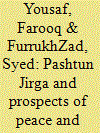

|
|
|
|
|
| Summary/Abstract |
There is growing recognition and appreciation of traditional approaches towards peace and conflict resolution across the world. This article aims to highlight the crucial role and consequential importance of traditional mechanisms of peace and conflict resolution in Pakistan’s terror-hit Pashtun ‘tribal’ areas, formerly known as the Federally Administered Tribal Areas (FATA). These ‘peripheral’ areas of Pashtun tribes stand in relative isolation from the ‘centre’ of the Pakistani ruling establishment. Moreover, with the onset of militancy since 2001 in the Afghanistan–Pakistan region, the situation has turned worse for the local Pashtun tribes. The article discusses the changing role of traditional mechanisms and local structures of peace and conflict resolution, arguing that colonial legacies have failed to prevent, manage, resolve or transform conflicts in post-colonial states such as Pakistan. Furthermore, the Pashtun cultural code of Pashtunwali, along with its various tenets and structures, especially Jirga (Pashtun tribal council) and Lashkar (tribal militia), is also discussed in the article. The article concludes that the changing socio-political situation, along with the rise of the secular Pashtun Tahafuz Movement (PTM), is presenting a challenge to ‘tribal’ Pashtun patriarchal values as well as traditional structures like Jirga in the region.
|
|
|
|
|
|
|
|
|
|
|
|
|
|
|
|
| 9 |
ID:
157486
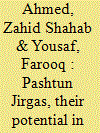

|
|
|
|
|
| Summary/Abstract |
Relations between Pakistan and Afghanistan have mostly been hostile since 1947. The animosity has grown in complexity from various territorial disputes to frequent allegations of cross-border terrorism in the post-9/11 era. This article first makes a case for involving Jirgas, a traditional dispute resolution mechanism among Pashtuns, for improving peace dialogues between both countries. It presents evidence of the traditional acceptability of Jirgas by Pashtuns on both sides of the border and assesses previous official bilateral attempts of using Jirgas. It then proceeds to propose some new policy recommendations focused on national reconstruction of Afghanistan, which include involvement of the Taliban as an important local stakeholder. The dual key argument then becomes, first, that since Jirgas have long-standing local legitimacy and acceptability both in Afghanistan and Pakistan, using the strength of their social recognition would allow higher-level bilateral negotiations between the neighbours, enhancing the effectiveness of new and locally more credible forms of multi-track diplomacy. Second, reinvigorating the Jirga system would allow the Afghan people themselves to engage in fuller multi-dimensional debates on sustainable modalities for their own future, on terms to be set by them, not outsiders.
|
|
|
|
|
|
|
|
|
|
|
|
|
|
|
|
| 10 |
ID:
187779
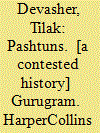

|
|
|
|
|
| Publication |
Gurugram, HarperCollins Publishers, 2022.
|
| Description |
xxx, 463p.hbk
|
| Standard Number |
9789394407633
|
|
|
|
|
|
|
|
|
|
|
|
Copies: C:1/I:1,R:0,Q:0
Circulation
| Accession# | Call# | Current Location | Status | Policy | Location | IssuedTo | DueOn |
| 060250 | 320.55095491/DEV 060250 | Main | Issued | General | | RF053 | 04-May-2024 |
|
|
|
|
| 11 |
ID:
127662
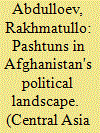

|
|
|
|
|
| Publication |
2013.
|
| Summary/Abstract |
For the past fifty years, academics and politicians have been discussing the problem of Pashtun domination in the political life and state structures of Afghanistan. From the very beginning (the Afghan state appeared in 1747), supreme power belonged to members of several Pashtun clans, not counting the two brief periods when ethnic Tajiks filled the highest post: Habibullah Khan Kalakani in 1929 and Burhanuddin Rabbani in 1992-2002.
Until 1973, when Afghanistan ceased to be a monarchy, members of the Pashtun political elite ruled the country as emirs and kings; Pashtuns resided at the very top of the pyramid of power. They owed their exalted position to the prevailing opinion that Pashtuns created the state of Ahmad Shah Durrani.
This is true: the main Pashtun tribal groups and unions set up the Afghan state and remained the pillar of its rulers; their fighting force and military skills were the main factors that added strength to the power of the emir (king) and the key elements of the armed forces of Afghanistan.
|
|
|
|
|
|
|
|
|
|
|
|
|
|
|
|
| 12 |
ID:
118298
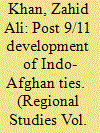

|
|
|
| 13 |
ID:
111194
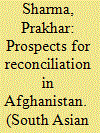

|
|
|
| 14 |
ID:
172566
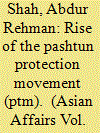

|
|
|
|
|
| Summary/Abstract |
In early 2018, the Pashtun Tahafuz Movement or Pashtun Protection Movement (PTM) came suddenly into the limelight in Pakistan. The PTM is spearheaded by young firebrand Pashtun generation mainly from the war-torn North-West Frontier region of the country. However, the movement's rhetoric and policy agenda have put it at loggerheads with Pakistan's powerful military establishment. Whilst the PTM blames the Army for the plight of Pashtuns in the country, the military has labelled the movement as a foreign ‘proxy’ working at the behest of other countries against the institutions of its own state. In essence, both parties have resorted to conspiracy theories of one sort or the other. This development has strained the nascent process of ‘mainstreaming’ the Federally Administered Tribal Areas (FATA) into becoming a normalized part of Pakistan. However, there are some encouraging political aspects and developments related to this debate. These include the increasingly wide-scale use of social media for political activism and awareness; various impacts on merger of FATA with Khyber Pakhtunkhwa; and also the successful conduct of recent provincial elections in the region.
|
|
|
|
|
|
|
|
|
|
|
|
|
|
|
|
| 15 |
ID:
190221


|
|
|
|
|
| Summary/Abstract |
Available essays on Pashtunwali describe this system of customary laws and ethics for the most part as a static model of ideal conduct, without a diachronic perspective. Offering a historical approach to Pashtunwali, this article introduces and analyzes fragmentary data on the nənawāte custom from early modern Pashto sources—historiographical narratives of the Khatak chieftains in the Tarikh-i Murassaʿ (finished 1724) and the romantic poem Adam Khan aw Durkhaney (1706/7). Recorded cases of resorting to nənawāte, considered among the main pillars of Pashtunwali but still variously interpreted, prove that this is a complex legal custom based on the right to appeal for protection, mediation, and reconciliation. As a common means of dispute settlement, nənawāte originates with a binding request for help and favor in a conflict situation. The discussion of nənawāte is preceded by a brief overview of the existing scholarly definitions of Pashtunwali, underscoring its emic perception as an ethnic identity marker.
|
|
|
|
|
|
|
|
|
|
|
|
|
|
|
|
| 16 |
ID:
081071
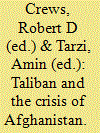

|
|
|
|
|
| Publication |
Cambridge, Harvard University Press, 2008.
|
| Description |
ix, 430p.hbk
|
| Standard Number |
9780674026902
|
|
|
|
|
|
|
|
|
|
|
|
Copies: C:1/I:0,R:0,Q:0
Circulation
| Accession# | Call# | Current Location | Status | Policy | Location |
| 053125 | 958.1046/CRE 053125 | Main | On Shelf | General | |
|
|
|
|
| 17 |
ID:
114728
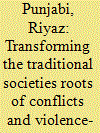

|
|
|
| 18 |
ID:
172570
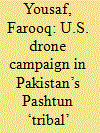

|
|
|
|
|
| Summary/Abstract |
The U.S. drone campaign in Pakistan’s Pashtun ‘tribal’ areas, formerly known as FATA, has remained one of the most contentious issues since the war on terror began in 2001 in Afghanistan. Though drone strikes have polarised opinions, they have also resulted in the elimination of lower, middle and higher-level leaders of all militant groups based in the ‘tribal’ region. The U.S. drone campaign in the former-FATA region had some success in the elimination of terrorists. But lack of access to the ‘tribal’ areas coupled with the secrecy surrounding the drone campaign resulted in major discrepancies in the total number of U.S. drone strikes and the resultant casualties. These factors have contributed towards an anti-drone and anti-U.S. narrative in Pakistan, largely manufactured by Pakistani mainstream media. With the last drone strike taking place almost a year ago, this article argues that the U.S. drone campaign may have finally halted in Pakistan. However, even with a gradual halt, the ‘tribal’ areas can witness drone strikes in the future if high-profile terrorists, based on actionable intelligence, are located in the region.
|
|
|
|
|
|
|
|
|
|
|
|
|
|
|
|
| 19 |
ID:
114462
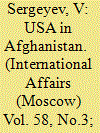

|
|
|
|
|
| Publication |
2012.
|
| Summary/Abstract |
LAST SPRING, U.S. President Barack Obama definitively decided to withdraw American troops from Afghanistan. According to his plan, out of the 102,000 servicemen currently stationed in Afghanistan, only 20,000-30,000 will remain in the country by late 2014 in order to carry out support and supply functions.1 Over 40,000 servicemen from Great Britain, Canada, Australia, and other U.S. allies will, most likely, be withdrawn entirely. Between 2010 and the first half of 2011, there were almost 150,000 soldiers from over 40 states in Afghanistan, yet this number did not suffice for victory. According to a study by the British Parliament, the Afghan central government and the troops of the international coalition control only a third of the country.2
|
|
|
|
|
|
|
|
|
|
|
|
|
|
|
|
|
|
|
|
|